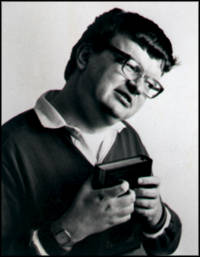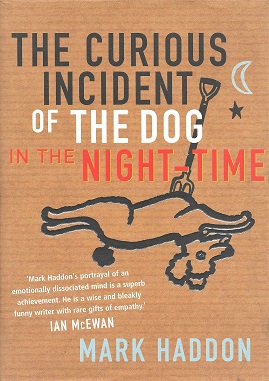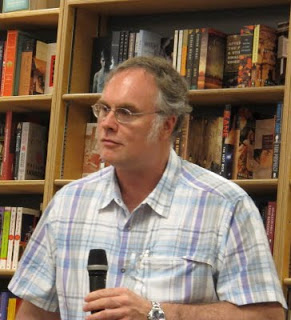
Asperger syndrome (AS), also known as Asperger's syndrome or Asperger's, is a term formerly used to describe a neurodevelopmental condition characterized by significant difficulties in social interaction and nonverbal communication, along with restricted, repetitive patterns of behavior and interests. Asperger syndrome has been merged with other conditions into autism spectrum disorder (ASD) and is no longer considered a stand-alone diagnosis. It was considered milder than other diagnoses which were merged into ASD due to relatively unimpaired spoken language and intelligence.

Savant syndrome is a phenomenon where someone demonstrates exceptional aptitude in one domain, such as art or mathematics, despite significant social or intellectual impairment.

The Curious Incident of the Dog in the Night-Time is a 2003 mystery novel by British writer Mark Haddon. Its title refers to an observation by the fictional detective Sherlock Holmes in the 1892 short story "The Adventure of Silver Blaze". Haddon and The Curious Incident won the Whitbread Book Awards for Best Novel and Book of the Year, the Commonwealth Writers' Prize for Best First Book, and the Guardian Children's Fiction Prize. Unusually, it was published simultaneously in separate editions for adults and children.

Anthony John Attwood is a British psychologist notable for his work on Asperger syndrome. He resides in Queensland, Australia, where he is an Associate Professor at Griffith University.
Gerald Newport (1948–2023), better known as Jerry Newport, and Mary Newport, née Mary Meinel, also known as Mary Meinel-Newport, were authors, advocates, and public speakers who had been diagnosed with Asperger syndrome and whose lives became the basis for the 2005 film Mozart and the Whale. Their written works include self-help books related to autism and Asperger's, as well as their 2007 memoir Mozart and the Whale: An Asperger's Love Story.

Societal and cultural aspects of autism or sociology of autism come into play with recognition of autism, approaches to its support services and therapies, and how autism affects the definition of personhood. The autistic community is divided primarily into two camps; the autism rights movement and the pathology paradigm. The pathology paradigm advocates for supporting research into therapies, treatments, and/or a cure to help minimize or remove autistic traits, seeing treatment as vital to help individuals with autism, while the neurodiversity movement believes autism should be seen as a different way of being and advocates against a cure and interventions that focus on normalization, seeing it as trying to exterminate autistic people and their individuality. Both are controversial in autism communities and advocacy which has led to significant infighting between these two camps. While the dominant paradigm is the pathology paradigm and is followed largely by autism research and scientific communities, the neurodiversity movement is highly popular among most autistic people, within autism advocacy, autism rights organizations, and related neurodiversity approaches have been rapidly growing and applied in the autism research field in the last few years.

John Elder Robison is the American author of the 2007 memoir Look Me in the Eye, detailing his life with undiagnosed Asperger syndrome and savant abilities, and of three other books. Robison wrote his first book at age 49.

House Rules (2010) is the eighteenth novel by the American author Jodi Picoult. The novel focuses on a young adult male, Jacob Hunt, with Asperger's syndrome living in Townshend, Vermont, who is accused of murder. The novel follows the struggle between Jacob and his family, the law, and his disability.

Michael Fitzgerald is an Irish professor of child and adolescent psychiatry, specialising in autism spectrum disorder (ASD).

Freaks, Geeks, and Asperger Syndrome: A User Guide to Adolescence is a non-fiction book about Asperger syndrome published in 2003. The then 13-year-old author, Luke Jackson, has Asperger syndrome himself. Jackson wrote the book because he felt there was not enough useful information on the Internet about the subject.

Asperger's Are Us is an American comedy troupe. They are the first comedy troupe consisting entirely of people with Asperger syndrome, though their shows do not reference autism at all.

Rudy Simone is an American author of books on Asperger's Syndrome.

Aspergirls: Empowering Females with Asperger Syndrome is a non-fiction book written by American author Rudy Simone. It was published in 2010 by Jessica Kingsley Publishers. The book is about women and girls who have Asperger syndrome and their experiences. It was written to help girls and women who have been diagnosed with Asperger's.
Gunilla Gerland is a Swedish author and lecturer on the topic of autism. Her written works include Secrets to Success for Professionals in the Autism Field: An Insider's Guide to Understanding the Autism Spectrum, the Environment and Your Role and her autobiography A Real Person: Life on the Outside.
Alexei Maxim Russell is a Canadian writer of fiction and non-fiction. He is most notable as the creator of Trueman Bradley. Trueman Bradley is a fictional character in a series of detective novels, with an international following. Bradley is characterized as a genius detective with Asperger's Syndrome. His work has developed a cult following in educational and advocacy circles, having been added to school lesson plans and officially adopted as educational material for government programs, which focus on disability awareness and equality.
The history of autism spans over a century; autism has been subject to varying treatments, being pathologized or being viewed as a beneficial part of human neurodiversity. The understanding of autism has been shaped by cultural, scientific, and societal factors, and its perception and treatment change over time as scientific understanding of autism develops.
Yuri Nakagawa (中川友里) is a Japanese fashion model, public figure and popular fashion blogger. She is an official fashion blogger for JFW, which is an international fashion exhibition, regularly organized by prominent Japanese fashion newspaper, Senken Shimbun.

Jennifer Cook (formerly O'Toole) (born October 24, 1975) is an American author and speaker. She is known for her six Asperkids books, which have been translated into six languages and include the winner of the Autism Society of America's Book of the Year Award. Her memoir Autism in Heels: The Untold Story of a Female Life on the Spectrum is a Wall Street Journal Bestseller, a "Best Book" title winner by Publishers Weekly, and named a "Best Memoir" and one of both the "Best Autism Books of All Time" and "Best-Selling Autism Books of All Time" by BookAuthority. She is the on-camera autism expert in Netflix's series Love on the Spectrum.

Stephen Mark Shore is an American autistic professor of special education at Adelphi University. He has written several books on autism: College for Students with Disabilities, Understanding Autism for Dummies, Ask and Tell, and Beyond the Wall. Currently, he serves on the board of Autism Speaks, and is one of the first two autistic board members in its history, looking to improve the potential of those on the autism spectrum. He once headed the Asperger's Association of New England and was on the board of the Autism Society of America.













